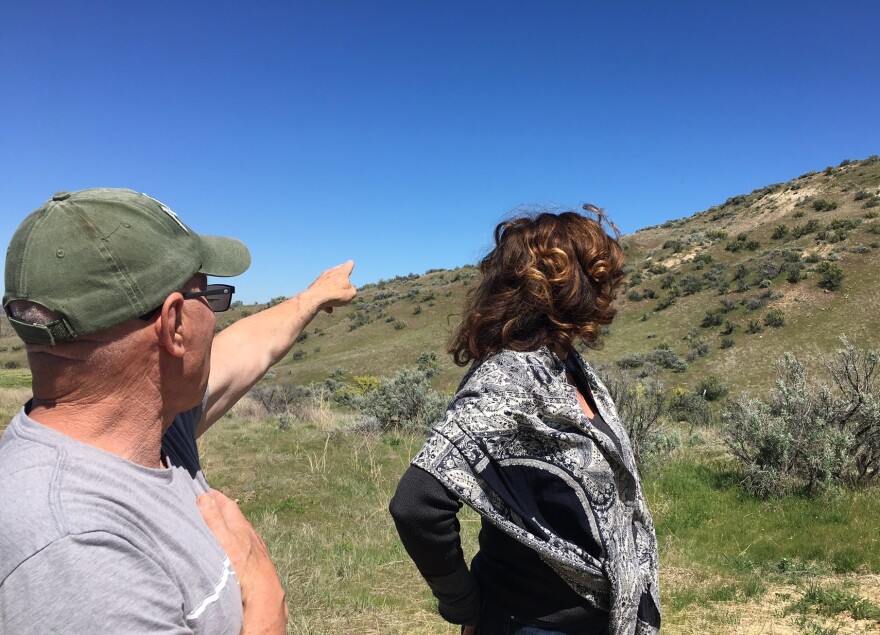Toward the end of Table Rock Road in Boise, Bob DiGrazia points to a ridge a few hundred yards away.
“It was on January 5th I walked up here," he says. "And I could see birds and coyotes over here. Like coyotes on one carcass, six to eight [of them].”
DiGrazia is a hunter and he often comes to this spot to just watch elk on the ridge grazing in the winter. That January day, he could see dead elk on the ground in distance. At first he thought poachers were to blame.
He called Idaho Fish and Game and a conservation officer came up right away.
“He called me when he got right up here and he says, 'They’re all poisoned with Japanese yew.’”

Japanese yew is one variety of a common landscaping plant. The dwarf variety gets about three-feet tall, while regular size breeds can grow quite large.
Idaho Fish and Game estimates that at least 75 elk and pronghorn have died from eating toxic yew across the state this year, along with an unknown number of deer.
That’s where Angela Rossman comes in. Rossman is part of the Idaho chapter of the Great Old Broads for Wilderness, a national organization that advocates for environmental issues like protecting elk and other wildlife.
“The winter I think reminded us how vulnerable they really are, especially in the wild and urban interface," Rossman says.

Rossman has made it her mission to ban non-native yew. One of the first things she did was call big box stores in the Treasure Valley to ask them to remove the evergreen. Costco reacted quickly.
“When I called [Costco] headquarters . . . in 17 minutes they had it off the floor. That’s pretty impressive.”
Rossman understands why it’s a popular plant. It grows well in the shade and requires little maintenance. Insects stay away from it – another bonus. But it’s toxic if ingested and kills big game animals from a heart attack within just a couple of hours.
She wants to see garden centers replace the yew with non-toxic alternatives.
“There are no [yew] growers here in Idaho – so we’re not taking bread and butter or the bottom line from anyone.”
After an attempt to get a law passed in the state legislature this spring, Rossman asked the State Department of Agriculture to add the evergreen to the noxious weed list. Deputy ag director Brian Oakey summarizes the noxious weed state law like this:
“Any weed that has the potential to cause harm to the environment or public health or property,” Oakey says.
He says the policy could be amended through the negotiated rule-making process.
“Citizens can petition an agency to change a rule or change a process or procedure that we follow.”
Educate Or Regulate?
But to Ann Bates, the plant does not belong on the noxious weed list at all. Bates is the executive director of the Idaho Nursery and Landscaping Association, which represents growers, distributors and retailers.
“This is not a plant that truly fits into that description,” says Bates.
She says the real culprit is not the yew but rather the exceptionally snowy winter Idaho experienced. The snow forced animals down into urban areas where they don’t typically forage. They ate any plants they could find – including the poisonous evergreen. Bates says one difficult season for wildlife is not a good reason to ban the plant statewide.
“What we’d like to see is a lot more education. Education for the public, for us, education for our members. So that they understand that the plant is toxic.”
"This is not a plant that truly fits into that description." -- Ann Bates
Bates says better information for landscapers and clear labels on the plants will help people understand the risks. She says for most people who live in urban areas – they’ll never run into the problem of wildlife eating from their yard.
But there is a place where people and wildlife constantly interact in Idaho. John Cenarussa is the noxious weed superintendent in Blaine County. After elk died from yew poisoning two winters ago, county commissioners passed a local law – forcing homeowners to remove the plant.
“We treat it like any other noxious weed," says Cenarussa. "I mean it’s their responsibility – it’s really not ours. But we do have to have a little bit of authority behind us as far as the law.”
Cenarussa sees education and the law as two sides of the same coin. He says once homeowners understood the problem, they’ve been eager to get rid of the yew.
On the back side of Table Rock in Boise, Angela Rossman walks down a windswept trail next to Idaho Fish and Game’s Wildlife Management Area – about a mile from where the dead elk were found. Charred sage brush stand next to greening grass where the Table Rock fire burned through last year.

Rossman knows getting the yew banned through negotiated rule-making with the state won’t be easy, but this is the path she’s taking.
“Well I hope there will be a lot of people at the state," says Rossman. "Because the idea of negotiated rule-making is to provide an open forum for all stakeholders."
The first negotiated rule-making meeting is Tuesday, May 16 at 1:30 p.m. The meeting is open to the public at the Department of Agriculture in Boise.
Support for environmental reporting on Boise State Public Radio comes in part from the Larry & Pam Cardinale Preservation Fund.
Find reporter Frankie Barnhill on Twitter @FABarnhill
Copyright 2017 Boise State Public Radio



